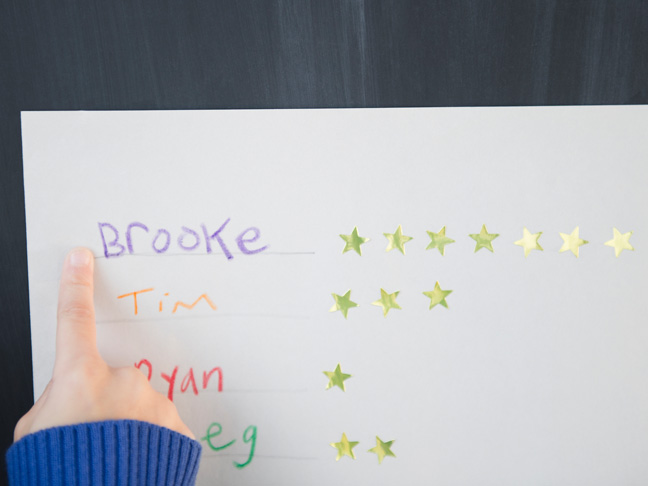A mom once told me that she set up a reward system to help “fix” her daughter’s bedwetting problem. It was the last year of preschool for this child and she was close to her fifth birthday. Evidently she potty trained before she even turned 2, but she was having trouble staying dry at night. Her mom was sure that the sticker chart and a giant box of prizes would do the trick.
I casually asked what would happen on the nights her daughter didn’t stay dry. Would her mom simply ignore it or remind her of the chart and prizes? How often would they discuss the chart? Was it posted on her bedroom door as a constant reminder? I don’t give advice unless I am asked, so I listened and asked questions as this mom worked through her thoughts on the matter.
A few months later, we talked again and the mom was completely frustrated. Her daughter had only earned a few stickers and didn’t seem to care much about the prizes anymore. She couldn’t understand why this system wasn’t working and she was tired of waking up in the middle of the night because her sheets were soggy.
I explained to the mom that reward systems don’t work for bedwetting because it’s not a behavioral issue that may be corrected with rewards. Children don’t choose to wake up in the middle of the night with wet pajamas and a soggy bed. Rather, many of them have small bladders, and this can make it difficult to stay dry at night. Other children lack enough of the necessary hormones to decrease nighttime urination. And, in some cases, they simply don’t yet know when their bladders are full.
And here’s the thing: Setting up a reward system for bedwetting can trigger feelings of shame, inadequacy, and low self-confidence when kids fail to earn those coveted stickers. It also rewards kids for something they really can’t control. They can’t force their bladders to mature at a faster rate, nor can they signal their brains to wake them during the night when their bladders are full.
While most children achieve nighttime bladder control by age 5, many of them continue to wet the bed between the ages of 5 and 7. Instead of setting kids up for failure with reward systems that won’t solve anything, try a few of these strategies, instead:
1. Remind her to go to the bathroom during the day. Many young children don’t take breaks from playing to pee when they need to. Instead, they hold their urine for longer periods of time during the day. This can lead to bedwetting as the bladder empties itself once the child is no longer holding. Talk to your kid about what happens to the bladder when she avoids taking the time to empty it regularly. Use a watch with pre-set alarms or provide verbal reminders to help your child get into the habit of paying attention to her bladder throughout the day.
2. Use products that help ease the discomfort of bedwetting. There are some great products on the market that help kids learn to stay dry at night and provide a less stressful sleep experience.
• GoodNites: Absorbent training pants can decrease the stress factor for kids. I find that kids who struggle with bedwetting report a spike in anxious feelings before bed, so I often recommend GoodNites products to help relieve their anxiety.
• Bedwetting alarms: Alarms that include a moisture sensor alert your child to wake up and use the bathroom.
• Waterproof sheets: Waterproof sheets can help reduce that soggy feeling, and many parents report that doubling up the sheets helps when a nighttime sheet change is necessary.
3. Be encouraging and empathetic. Acknowledge all of his feelings about bedwetting, both those associated with a soggy bed and those that result from a dry night.
When parents learn to step back and work with the child, they remove the pressure and anxiety that often accompanies bedwetting. More often than not, bedwetting resolves without intervention. If it doesn’t, take comfort in knowing that your child is not alone in this and there are products available to help you through the hard nights.









